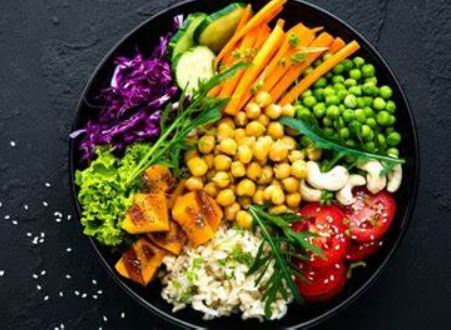Comprehensive Guide to Plant-Based Macros
Understanding macronutrients is key to achieving optimal health and wellness on a plant-based diet. Whether you’re an athlete, aiming for weight loss, or simply want to live a healthier lifestyle, mastering the balance of macronutrients can transform your diet and ensure you’re meeting all your nutritional needs.
What Are Macronutrients?
Macronutrients, often referred to as macros, are the nutrients that your body needs in large amounts to function properly. They provide energy and play vital roles in maintaining your body’s systems. There are three main types of macronutrients:
- Protein – Essential for building and repairing tissues, producing enzymes, and supporting overall growth.
- Carbohydrates – The body’s primary energy source, fuelling everything from brain function to physical activity.
- Fats – Critical for energy storage, hormone production, and supporting cell health.
On a plant-based diet, these macronutrients come from fruits, vegetables, grains, legumes, nuts, and seeds. Unlike animal-based sources, plant-based foods often provide additional benefits like fibre, antioxidants, and essential vitamins and minerals.
Benefits of Balancing Macronutrients on a Plant-Based Diet
Achieving the right macronutrient balance offers several health benefits:
- Sustained Energy: A proper ratio of carbs, fats, and proteins ensures steady energy levels throughout the day.
- Improved Digestion: Plant-based foods are rich in fibre, which supports digestive health and regularity.
- Weight Management: Tracking your macros helps you create a balanced diet that aligns with your fitness or weight goals.
- Enhanced Athletic Performance: Plant-based macronutrients can support muscle recovery, endurance, and overall physical performance.
Macronutrient Sources for Plant-Based Diets
Protein Sources
Plant-based protein can come from a variety of foods:
- Lentils, chickpeas, and black beans
- Tofu, tempeh, and edamame
- Nuts (almonds, cashews) and seeds (chia seeds, hemp seeds)
- Whole grains like quinoa, farro, and bulgur
- Protein powders derived from peas, rice, or hemp
Carbohydrate Sources
Carbohydrates in a plant-based diet are typically nutrient-dense:
- Whole grains such as brown rice, oats, and barley
- Starchy vegetables like sweet potatoes, squash, and corn
- Fruits like bananas, apples, and berries
- Legumes including lentils, peas, and beans
Fat Sources
Healthy fats are essential and abundant in a plant-based diet:
- Avocados
- Nuts like walnuts and pistachios
- Seeds such as flaxseeds and chia seeds
- Coconut and olive oils
Common Macronutrient Ratios and Their Benefits
The ideal macronutrient ratio depends on your health goals, activity level, and personal preferences. Here are a few common approaches:
- 60/20/20: This ratio consists of 60% carbohydrates, 20% protein, and 20% fat. It is excellent for those with active lifestyles who need sustained energy.
- 50/25/25: A balanced ratio for general health and weight maintenance.
- 40/30/30: Often used for weight loss, this ratio includes a higher protein intake to support satiety and muscle preservation.
It’s important to adjust these ratios based on your individual needs, and consulting a nutritionist can help you personalise your macronutrient intake.
How to Hit Your Macros on a Plant-Based Diet
- Track Your Intake: Use apps like MyFitnessPal or Cronometer to monitor your macros and calories.
- Plan Ahead: Prepare meals with a clear idea of their macronutrient composition.
- Focus on Whole Foods: Choose nutrient-dense ingredients to ensure you meet your macronutrient goals while also obtaining essential micronutrients.
- Supplement When Necessary: For protein, consider using plant-based protein powders to meet daily targets.
FAQs About Plant-Based Macros
What should my macros be on a plant-based diet?
Your macronutrient ratio will depend on your goals. For general health, a balanced ratio like 50% carbohydrates, 25% protein, and 25% fat is a good starting point. Athletes may benefit from higher carbohydrates (e.g., 60%) to support energy needs, while those aiming for weight loss might reduce carbs to around 40% and increase protein and fat.
What is the 80/20 rule for vegans?
The 80/20 rule suggests that 80% of your diet should consist of whole, unprocessed plant-based foods like fruits, vegetables, and whole grains, while 20% can include more processed or indulgent options. This approach encourages a sustainable and balanced way of eating.
How do vegans hit their macros?
Vegans can hit their macros by diversifying their food choices:
- Incorporate protein-rich foods like beans, lentils, and tofu in every meal.
- Add healthy fats from avocados, nuts, and seeds.
- Choose complex carbohydrates such as whole grains and starchy vegetables.
- Use tools like meal prep and tracking apps to ensure balance.
How much protein do I need a day on a plant-based diet?
The recommended daily protein intake for most individuals is 0.8 grams per kilogram of body weight. For those who are active or looking to build muscle, this can increase to 1.2–1.6 grams per kilogram. For example, a person weighing 70 kg (154 lbs) may need 56–112 grams of protein daily, depending on their activity level.
What is the best macro ratio for weight loss?
A common ratio for weight loss is 40% carbohydrates, 30% protein, and 30% fat. This balance helps maintain muscle mass, supports satiety, and provides enough energy for daily activities while creating a calorie deficit.
What are 60/20/20 macros for vegans?
The 60/20/20 macro ratio involves consuming 60% of your daily calories from carbohydrates, 20% from protein, and 20% from fats. This ratio is particularly beneficial for vegans who lead active lifestyles, as it prioritises energy-rich carbs while ensuring adequate protein and fat intake.
What We Think
Understanding and balancing macronutrients is essential for optimising health and performance on a plant-based diet. By focusing on diverse, whole-food sources of protein, carbohydrates, and fats, you can meet your nutritional needs while enjoying the benefits of a plant-based lifestyle. Whether your goal is weight loss, muscle gain, or general wellness, tracking your macros and adjusting your intake can help you achieve lasting results.
Explore our products and resources at Vegan Is Us for more tips and plant-based nutritional guidance.







